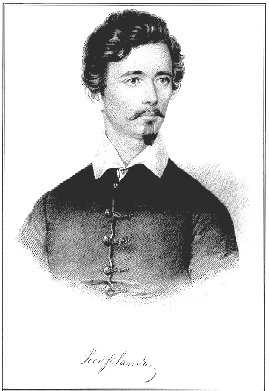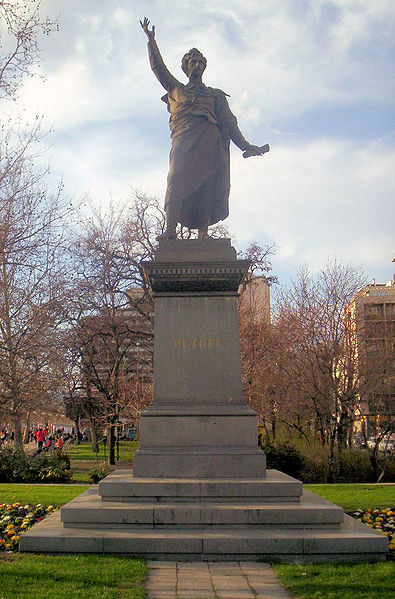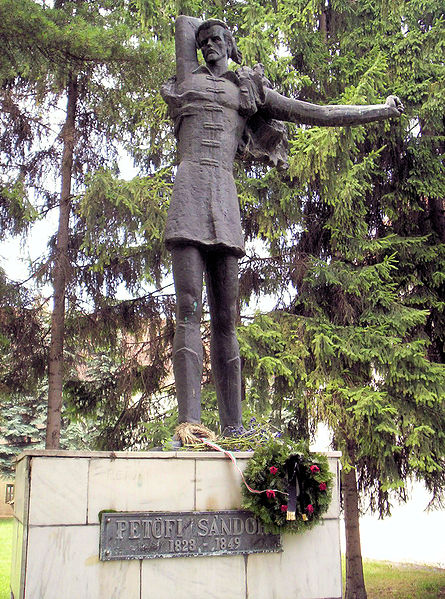<Back to Index>
- Physicist Satyendra Nath Bose, 1894
- Poet Sándor Petőfi, 1823
- Leader of the Republic of Firenze Lorenzo de' Medici, 1449
PAGE SPONSOR



Sándor Petőfi (January 1, 1823 – most likely July 31, 1849), born Alexander Petrovics (Slovak: Alexander Petrovič), was a Hungarian poet and revolutionary, the author of the Nemzeti dal, the poem said to have inspired the Hungarian Revolution of 1848, in which he played a key role. He is Hungary's national poet.
Petőfi was born at Kiskőrös, Kingdom of Hungary, then part of the Austrian Empire. His birth certificate, written in Latin, gives his name as Alexander Petrovics. His butcher-innkeeper father István has been variously described as an assimilated Serb or a Slovak. His mother, Mária Hrúz, was an immigrant from the Slovak inhabited part of Upper Hungary. Despite his ethnic origin, he had a very strong self-awareness of being Hungarian, becoming the spiritual leader of the revolutionary radicals who wanted to dethrone the Habsburgs and free Hungary from their rule.He not only magyarised his name but strenuously disclaimed any Slovak origins. He even denied his heavily Slovak-settled birthplace and his parents' Lutheran religion. The family lived for a while in Szabadszállás, where his father owned a slaughterhouse. Within two years, the family moved to Kiskunfélegyháza, and Petőfi always viewed the city as his true birthplace. His father tried to give his son the best possible education, but when Sándor was 15 the family lost its money due to the Danube floods of 1838 and the bankruptcy of a relative. Sándor had to leave the lyceum he was attending in Selmecbánya (today Banská Štiavnica in Slovakia). He held small jobs in various theatres in Pest, worked as a teacher in Ostffyasszonyfa and was a soldier in Sopron.
After a restless period of travelling Petőfi attended college at Pápa, where he met Mór Jókai, and a year later, in 1842, his poem A borozó ("The Wine Drinker") was first published in Athenaeum under the name Sándor Petrovics. On 3 November the same year he published this poem, using the name "Petőfi" for the first time. However, Petőfi was more interested in the theater. In 1842 he joined a traveling theater, but then had to leave it. He tried to keep himself financially afloat by writing for a newspaper, but that wasn't enough. Malnourished and sick, he arrived in Debrecen, where his friends helped him get back on his feet.
In 1844 he walked from Debrecen to Pest to find a publisher for his poems, in which he succeeded, and the poems were becoming increasingly popular. He relied on folkloric elements and popular, traditional song-like verses. Among his longer works is the epic János Vitéz ("Sir John", 1845). On the other hand, he felt he was forced into a folkish, wine-and-pubs, low-quality niche by his publisher, while in fact he also had an extensive Western-oriented education and revolutionary passions to write about. (Of course, these would be difficult to publish, due to the heavy censorship of the time).
In 1846, he met Júlia Szendrey in Transylvania, and they married the next year, against the will of her father, spending their honeymoon in the castle of Count Sándor Teleki,
the only aristocrat among Petőfi's friends. Afterwards, he was even
more possessed by thoughts of a global revolution. He moved to Pest and
joined a group of like-minded students and intellectuals who regularly
met at Café Pilvax. They worked at promoting Hungarian as a language of literature and
theatre. (The first permanent theatre (the National Theatre) performing in Hungarian opened at this time.) 15 March 1848 was Petőfi's day. Among the various leaders of the revolution - called Márciusi Ifjak ("Youths of March") - Petőfi was the key in starting the revolution in Pest, co-author and, respectively, author of the two most important written documents: the 12 Pont (demands to the Habsburg Governor-General) and the Nemzeti Dal. When the news of the revolution in Vienna reached
them on the 15th, Petőfi and his friends decided to change the date of
the "National Assembly" (a rally where a petition to the Hungarian
noblemen's assembly would be approved by the people), from 19 March to
the 15th. (This was a lucky decision, given that the authorities knew
their plans, and intended to arrest the revolutionaries on the 18th.) On
the morning of the 15th, the revolutionaries with Petőfi began to march
around the city of Pest, reading the poem and the 12 points to the
crowd (which swelled to thousands). Then, they visited printing
presses, declaring an end to all forms of censorship and printing
Petőfi's poem together with the 12 Pont. The mayor was forced by the crowds to sign the 12 Pont. Later, a mass demonstration was held in front of the newly-built National Museum, after which the group left for Buda on the other bank of the Danube. When the crowd rallied in front of the Imperial governing council, the representatives of Emperor Ferdinand felt
they have no choice but to sign the 12 points. As one of the points was
freedom for political prisoners, the crowd moved on to greet the newly
freed revolutionary poet Mihály Táncsics. Petőfi's
popularity waned as the memory of the glorious day faded, and the
revolution went the way of high politics: to the leadership of the
nobles. Those in the noblemen's Assembly in Pozsony, (today Bratislava)
had in fact been pushing for slower reforms at the same time -
delivering a list of demands to the Emperor on the 13th - but events
had overtaken them briefly. Petőfi disagreed with the Assembly, and
criticised the way they saw the goals and methods of the Revolution.
(His colleague Táncsics was imprisoned yet again by the new
government.) In the general election, he ran in his native area, but
did not get the seat. At this time, he wrote his most serious poem, Az Apostol ("The
Apostle"), an epic about a fictional revolutionary who, after much
suffering, attempts, but fails, to assassinate a fictitious king. Petőfi joined Polish revolutionary general Józef Bem's Transylvanian army, fighting a successful campaign against Habsburg troops, Hungarian, Romanian and Transylvanian Saxon militias. However, it was defeated repeatedly when Imperial Russia intervened to aid the Austrians. He was last seen in the battle of Segesvár (Sighişoara) on 31 July 1849, where it is generally accepted he was killed while fighting opposite Russian forces. A Russian military doctor recorded an account of Petőfi's death in his diary. He saw an unusual looking corpse killed by lance wound
to the stomach; the body had Petőfi's characteristic yellowish face and
matching clothing; Petőfi had the habit of wearing a civilian jacket
with uniform trousers. As
his body was never officially found, rumours of his survival persisted:
to some who refused to believe he had died, he was one of several
pseudo-Petőfis who roamed the land for many years; others continue to believe he was taken prisoner by the Russians and sent to Siberia. In his autobiographical roman a clef Political Fashions ("Politikai divatok", 1862) Mór Jókai fancied
his late friend's "resurrection": ten years later Petőfi (in the novel
he's named Pusztafi) returns as a shabby, declassed figure who lost his
faith even in poetry. In 1990 an eccentric millionaire organised an
expedition to Barguzin, where some archaeologists claimed to have unearthed Petőfi's skeleton. Petőfi started his career as a poet with "popular situation songs", a genre to which his first published poem, A borozó ("The
Wine Drinker", 1842), belongs. It is the song of a drinker praising the
healing power of wine to drive away all troubles. This kind of
pseudo-folk song was not unusual in Hungarian poetry of the 1840s, but
Petőfi soon developed an original and fresh voice which made him stand
out. He wrote many folk song-like poems on the subjects of wine, love, romantic robbers etc. Many of these early poems have become classics, for example the love poem A virágnak megtiltani nem lehet ("You Cannot Forbid the Flower", 1843), or Befordultam a konyhára ("I Turned into the Kitchen", 1843) which uses the ancient metaphor of love and fire in a playful and somewhat provocative way. The
influence of folk poetry and 19th-century populism is very significant
in Petőfi's work, but other influences are also present: Petőfi drew on
sources such as topoi of contemporary almanac-poetry in an inventive way, and was familiar with the works of major literary figures of his day, including Percy Bysshe Shelley, Pierre-Jean de Béranger and Heinrich Heine. Petőfi's
early poetry was often interpreted as some kind of role-playing, due to
the broad range of situations and voices he created and used. Recent
interpretations however call attention to the fact that in some sense
all lyrical poetry can be understood as role-playing, which makes the
category of "role-poems" (coined especially for Petőfi) superfluous.
While using a variety of voices, Petőfi created a well-formed persona for
himself: a jaunty, stubborn loner who loves wine, hates all kinds of
limits and boundaries and is passionate in all he feels. In poems such
as Jövendölés ("Prophecy",
1843) he imagines himself as someone who will die young after doing
great things. This motif recurs in the revolutionary poetry of his
later years. The influence of contemporary almanac-poetry can be best seen in the poem cycle Cipruslombok Etelke sírjára ("Branches
of Cypress for Etelke's Tomb", 1845). These sentimental poems, which
are about death, grief, love, memory and loneliness were written after
a love interest of Petőfi's, Etelke Csapó, died. In
the years 1844-45 Petőfi's poetry became more and more subtle and
mature. New subjects appeared, such as landscape. His most influential
landscape poem is Az Alföld ("The Plains"), in which he says that his homeland, the Hungarian plains are more beautiful and much dearer than the Carpathian mountains;
it was to become the foundation of a long-lived fashion: that of the
plains as the typical Hungarian landscape. Petőfi's poetic skills
solidified and broadened. He became a master of using different kinds
of voices, for example his poem A régi, jó Gvadányi ("The Good Old Gvadányi") imitates the style of József Gvadányi, a Hungarian poet who lived at the end of the 18th century. It
is interesting to note that several of Petőfi's poems were set to music
by the young Friedrich Nietzsche, who composed as a hobby while
studying classics at Pforta before beginning his career in philosophy.
Petőfi maintained a lifelong friendship with János Arany, another significant poet of the time. Arany was the godfather of Petőfi's son Zoltán. After
the Revolution was crushed, Petőfi's writing became immensely popular,
while his rebelliousness served as a role model ever since for
Hungarian revolutionaries and would-be revolutionaries of every
political colour. Today,
streets and squares are named after him throughout Hungary and
Hungarian-speaking regions of neighboring states; in Budapest alone,
there are 11 Petőfi streets and 4 Petőfi squares. A national radio station (Radio Petőfi), a bridge in Budapest and a street in Sofia, Bulgaria, also bear his name, as well as the asteroid 4483 Petöfi, a member of the Hungaria family. Petőfi has a larger than life terra cotta statue near the Pest end of Erzsébet Bridge, sculpted by Miklós Izsó and Adolf Huszár. There is a Petőfi statue in nearly every Hungarian city.